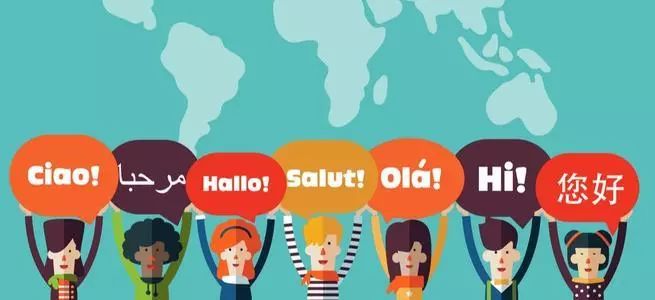434 阅读 2020-07-13 10:17:01 上传
以下文章来源于 计量语言学

关于语言 LANGUAGE
语言即传递信息的声音,是人类最重要的交际工具,是人们进行沟通的主要表达方式。人们借助语言保存和传递人类文明的成果。而语言作为文化现象是不断发展的。
Language is the voice of information transmission, the most important communicative tool of human beings, the main means of expression of people's communication. People use language to preserve and transmit the achievements of human civilization. Language is continuously developing as a cultural phenomenon.

语言简介 Introduction
汉语是世界上使用人口最多的语言,汉语和英语是世界上使用最广泛的语言。现在世界上查明的有5651种语言。在这些语言中,有1400多种还没有被人们承认是独立的语言,或者是正在衰亡的语言。
Chinese is the most popular language in the world, and Chinese and English are the most widely used languages in the world. There are now 5,651 languages identified in the world. Among these languages, more than 1,400 have not yet been recognized as independent ones or some are decaying.
语音、手势、表情是语言在人类肢体上的体现。文字符号是语言的显像符号。
Speech, gestures and expressions are the embodiment of language in human limbs. Text is the imaging of language symbols.
举两个栗子 ~ For example
①口头语言 Oral language

外交部发言人华春莹回应外媒记者“美方称中方经常出尔反尔”的问题时说:“我只想‘呵呵’两声。”
“呵呵”如何翻译?外交部标准答案:
Hmm. How interesting.
②书面语言 Written language
02
语言的特征 Characteristics
符号性和系统性
Symbolic and systematic
语言是社会约定俗成的表达观念的符号,是一种社会契约。一个社会接受一种表达手段而排斥另一种表达手段其实都是社会上的集体意识的习惯。
Language is a symbol of the expression of social convention and it is a kind of social contract. That one society accepts one means of expression but excludes another is actually a society's habit of collective consciousness.
任意性和线条性
Random and linear
任意性使得世界上的语言各式各样。线条性是指语言的能指是依托声音来完成的。
Randomicity makes the world's languages various. Linear character means that the signifier of the language is completed by sound.

不变性和可变性
Invariable and variable
语言是一个处在不断地运动变化发展之中的体系。这个体系中的各个要素既有一定的稳定性,也有一定的变动性。
Language is a system in the process of continuous change and development. The various elements of this system have a certain degree of stability, but also a certain degree of variability.
传承性和交际性
Inherited and communicative
传承性,是指人们通过语言这个工具直接或者间接影响着相关的人群,或者波及其他更广泛的区域,达到传承的效果。
Inheritance means that people directly or indirectly influence the relevant crowd through the language tool, or wave other broader regions to achieve the effect of inheritance.
另外,语言在人类社会发展当中,在人与人之间,古代人与现代人之间,中国人与外国人之间储存了文明的精华信息,承担着文明发展的桥梁。
In addition, in the development of human society, between individuals, ancient and modern people, Chinese and foreigners, language reserves the essence of civilization information, working as the bridge of the development of civilization.
03
人类语言与动物语言的区别 Difference
1、人类语言的单位具有明晰性的特点,动物语言是囫囵一团,难以分析。
The unit of human language has the characteristics of clarity, but animal language is obscure and difficult to analyze.
2、人类语言的音义结合具有任意性特点。话语可以搭配组织,能动性强。
The combination of pronunciation and meaning of human language has the characteristics of arbitrariness. Discourse can be organized and dynamic.
3、人类语言具有结构的二层性。它可以以有限的单位组成无限的句子。动物的语言没有这种二层性。
Human language has a structure of the two-layer. It can use limited units to form limitless sentences. Animal language does not have this characteristic.

4、人类语言具有开放性.。它是一种开放系统。虽然音位数量有限,可是经组合与替换,可以构成无限的句子。开放性还体现在语言是随着社会的发展而发展的。
Human language has openness. It is an open system. Although the number of phonemes is limited, by combination and replacement, they can constitute limitless sentences. Openness is also reflected in that language is developing with the society.
5、人类语言具有传授性。语言是后天掌握的,动物的语言则是天生的,不需要学习。
Human language can be imparted. Language is mastered after birth, but animals are born with an instinct for language and they do not need to learn.
6、人类语言不受时间、地点的限制。它可以表达过去的事情,也可以阐述未来。
Human language is not limited by time or place. It can express the past and explain the future.
04
衍生学科:语言学 Linguistics
语言学是以语言为研究对象的科学。它的任务是研究、描写语言的结构、功能及其历史发展,揭示语言的本质,探索语言的共同规律。通过研究人类最核心本能的语言能力,可以了解人类的本质。
Linguistics is a science which takes language as the object of its study. Its task is to study and describe the structure, functions and historical development of languages, reveal the essence of languages and explore the common law of languages. By studying the language ability, the most central human instinct, we can understand the essence of human beings.

除了认识人类语言本质外,语言学研究还具有多种应用价值。在语言教育方面,借由对于语言本身的了解,编成各种词典、文法书、教科书供人学习语言,也有助于改善应对语言学习过程中遭遇到的困难与错误的能力。
In addition to understanding the nature of human language, the research of linguistic also has a variety of application value. In the field of language education, by understanding the language itself, we can compile various dictionaries, grammar books and textbooks for people to learn the language. It also helps to improve the ability to deal with the difficulties and mistakes encountered in the process of language learning.

对于不同语言,语言学理论对于笔译和口译有更多具体的指导,也有助于利用科技来进行机器翻译。
Linguistic theory has more specific guidance on translation and interpretation about different languages, and also helps to use technology for machine translation.












